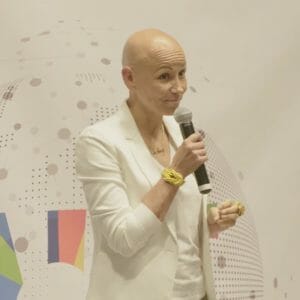Karla Ruiz Cofiño is the founder of Digital Awareness, and the 2019 WE Empower Awardee Latin America and the Caribbean. The organization aims to equip people with the knowledge and digital skills they need to become active contributors to online communities. It teaches individuals how to become positive Digital Citizens and Digital Leaders that harness the power of social media and Digital Strategies to make a better world. Its mission is to recruit, inspire, and empower people to become more digitally aware, creating a future of interconnected leaders who keenly utilize the internet as a tool for success.
Advancing the Sustainable Development Goals
Digital Awareness supports SDG 5 on Gender Equality and the empowerment of women and girls by designing programs specifically for women’s success in which they are taught how to design their business to have a positive impact on the environment. By teaching individuals how to effectively research sustainable and ethical brands, the organization is able to support SDG 12 Responsible Consumption and Production. SDG 16 on Peace, Justice and Strong Institutions is supported through concrete exercises that promote Digital Empathy.
COVID-19 Impact
As those who have on-line access, transition to mainly communicating and working through a digital medium, it has become a requirement to understand and effectively use online tools. Cofiño and her team are continuing to provide online services to train leaders in online strategies, including helping people build their social capital. In an episode of the “Voices of Resilience” podcast with Alyse Nelson, WE Empower UN SDG Challenge Co-Chair and President and CEO of Vital Voices, Cofiño shared, “It is more important to have a small community that one can engage with rather than a large community that one has no influence over.”
Cofiño has found herself providing more than digital training. She has utilized Facebook Live to speak about the little things that people can do to improve their mental health during quarantine. Contrary to expectations, Cofiño has spoken against increased screen time for young kids at home during quarantine. She says it is more important now to ensure that young kids are not becoming reliant on screens from a young age, citing that increased screen time use in young kids can cause attention issues as they get older. Moreover, she says to engage with the content that kids are viewing and to use this screen time to create critical thinkers. Cofiño says that it is important to teach children how to assess the content they are viewing, asking them why characters act in certain ways and how their actions influence other people. By engaging with kids through their entertainment, they are more likely to retain what they are learning.
